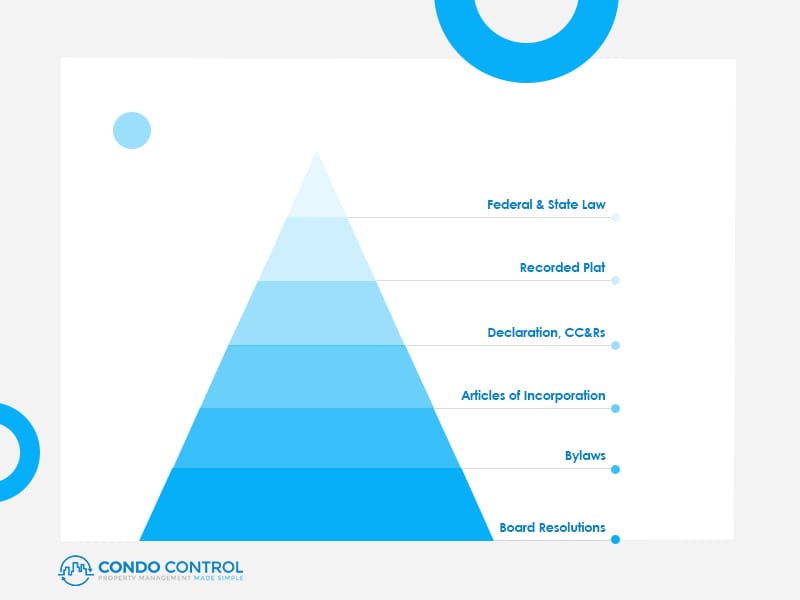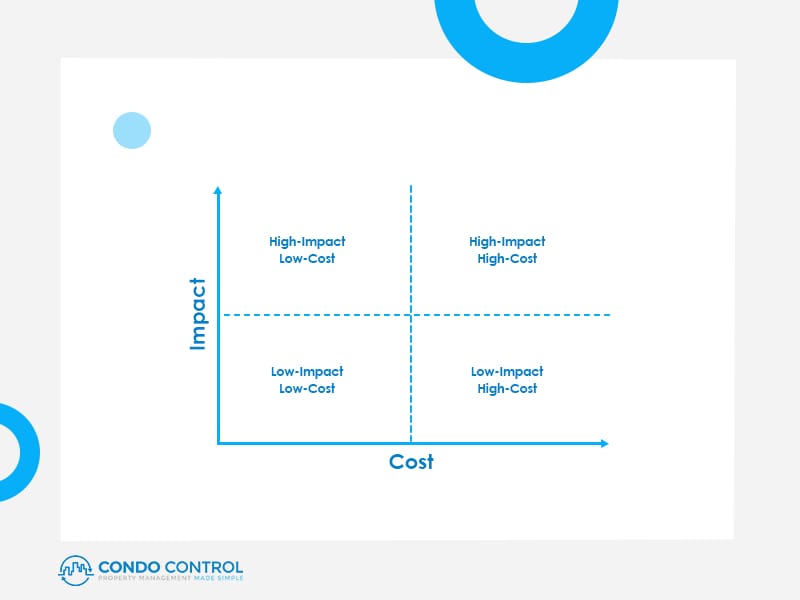There is a saying that goes, “Rules are made to be broken.” Sometimes this is true, especially when society and times are changing so fast. Some rules that were appropriate from the past no longer apply. These changes can affect individuals and certainly HOA (Homeowner association) communities where many people live in a community and share common spaces.
Download our free HOA Amendment template
For example, with the introduction of electric vehicles (EV) and a significant number of HOA residents purchasing them, HOAs have had to develop new EV policies to accommodate how and where their electric vehicles can be charged.
This is just one of many examples where HOA amendments are needed to accommodate new developments.
Let’s start with the basics regarding amendments.
Table of contents
- What is an Amendment?
- What is a Resolution?
- Can You Amend HOA Documents?
- HOA Document Hierarchy
- Why HOA Rules Need to Be Amended
- Top 6 Reasons HOA Guiding Documents Can Become Problematic
- Challenges to Amending HOA Legal Documents
- A Helpful Process to Amend HOA Documents
- HOA Amendments on the Horizon
What is an Amendment?
An amendment is a change or addition to the contents of both a legal and non-legal document, specifying the exact wording of that change. Often, amendments allow documents to be refined as time goes on without replacing the document completely. In a board meeting, you may hear that a resolution has been passed but this is not the same as an amendment.
What is a Resolution?
A resolution is the formal notice that the Board has approved a change. As you can see, an amendment and resolution are related to each other but not the same.
Can You Amend HOA Documents?
In a word yes, HOA documents can be amended. However, specific documents are legal governing documents and are therefore legally binding and enforceable. So, any amendments made to them must go follow a legal process.
The following are primary HOA legal documents.
Recorded Plat:
- Indicates location and land boundaries
- Defines a subdivision map
- Filed at the county recorder’s office
Covenants, Conditions & Restrictions:
- Addresses limitations of property use
- Resident obligations
- Payment of fees
- HOA to preserve and improve property values
Articles of incorporation addresses the HOA:
- Nonprofit status
- Name
- Location
- Purpose
Bylaws address how the association operates, including:
- Requirements and procedures to run the association
- Directions for board elections
- Voting rights
- When meetings are held
Rules and regulations address guidelines for the community:
- Policies pertaining to any number of things (damages, pets, maintenance etc.)
Keep in mind these documents don’t all carry the same weight, meaning there is a hierarchy.
HOA Document Hierarchy

Just like laws of the land change in a society over time—for example smoking inside restaurants is now prohibited—so do HOA rules for a variety of reasons.
Why HOA Rules Need to Be Amended
HOA rules don’t stay relevant forever. Your HOA is responsible for creating and upholding a pleasant community, where everyone enjoys living while maintaining and increasing the value of the property. Usually, HOA governing documents are helpful to make sure this is accomplished. However, sometimes these rules can do just the opposite.
Top 6 Reasons HOA Guiding Documents Can Become Problematic
An HOA may decide to amend its current rules because they are:
1. Lagging behind technology
Thumbing through dusty binders to find paper bylaws and other important documents is a thing of the past. Residents and HOAs need immediate access to documents and therefore opt for digital software to help them do this. An amendment regarding how an HOA and its residents may be needed as a result.
2. Obsolete (No longer observed/enforced)
Terms and provisions made when the HOA community was first established no longer apply. For example a developers rights and obligations don’t matter anymore because the community has been established for 20 plus years, and those developer terms are now obsolete but they are still listed.
3. Conflict with present laws
When changes are made in one document it’s very important to understand how the other HOA documents are impacted. Say a change is made in the bylaws, that change may create a conflict with the articles of incorporation. Inconsistencies in governing documents lead to confusion.
4. Too ambiguous and require clarification
An HOA may have a rule that permits pets. Most might assume a dog or cat or bird, but what if a resident wants to bring a pet snake into the community. The rules would need to be amended to define what type of pet is allowed in the community. The CC&Rs may also have to be amended to indicate that the HOA Board has the authority to enforce new pet regulations.
5. Correcting errors
Mistakes happen. It’s simply human error. When an error has been made and is recognized an amendment will be needed to correct the error in a document.
6. Directors won’t perform their duties well
The Board has a lot to consider and the guiding legal documents are crucial to showing them what they can and cannot do. If the legal documents conflict, are outdated, or has errors in it, the Board won’t be able to be the best board for the community.
Some of the reasons HOA legal documents can become an issue are pressing and they all can cause HOAs to review and amend their documents.
Even though we can now see what needs to be amended, doing so is not without its challenges.
Challenges to Amending HOA Legal Documents
Because of the nature of the different legal documents, amending them requires different approaches.
Let’s explore some of the roadblocks involved in adding, changing or removing content in HOA documents.
Resistance
Homeowners may disagree with proposed changes causing conflict in the community among residents.
Lack of votes
When resident votes are required to make a change it can be difficult getting enough people to participate in the voting process.
Unlawful
If changes are made and they do not comply with state laws or other HOA governing documents it could open up legal issues.
Cost
An HOA board is composed of volunteers with a mix of educational and professional backgrounds that can be helpful when collaborating and reaching a decision, however amending HOA documents can demand a degree of expertise best provided by a legal specialist. The HOA will need to retain legal counsel.
So, knowing the challenges that can arise let’s look at some must haves in order to make necessary amendments.
A Helpful Process to Amend HOA Documents
When changes must be made, you can follow certain processes to get it done.
Identify community needs
While the world is changing around us, not all changes can and do impact every HOA community. Really assess how a particular amendment will impact your community in the present and the future.
For example, in California a relatively new HOA law Civil Code Section 4040 provides that an HOA must deliver a document according to how the owner wants to receive it. Meaning they may prefer electronic communications over printed.
Now, your HOA may already be doing this, or your HOA is not in California, so you wouldn’t have to go through the trouble and expense of including it in your legal documents.
You can always use an Impact vs. Cost matrix too to help your HOA decide if amending a document is worth the effort and expense.

Use software
It may not be an obvious go to, but HOA management software helps HOAs facilitate amendments quicker and easier creating a responsive Board and a progressive community.
For example, when you need to make quorum and increase voter participation e-voting is the way to go.
Simplify the voting process:
- Homeowners vote online if they can’t attend a meeting
- All responses are stored on a secure database
- E-voting is fully compliant in most states
The HOA may need to adopt a board resolution to approve electronic voting first.
Additionally, HOA management software offers the ability to organize the many and various HOA documents in a file library.
It can be stressful and simply inefficient to look for and find important HOA documents when trying to make amendments. Missing and/or unkept documents in random filing cabinets and folders make it difficult to retrieve HOA documents and related decision-making docs quickly.
Find exactly what you need:
- Upload an unlimited number of files to the library
- Set file access levels (manage who sees what)
- Search files with a click of a button using keyword searches
- Simple organization of files and folders
A digital file library lets you preview files, so you can quickly identify the details you need without having to thumb though tons of paperwork.
Make it a team effort
Create an ad-hoc committee to review document(s). Collaboratively, the committee can draft a resolution proposing amendments to the document, which will go to the Board for approval. One committee member from existing standing committees can be requested to join to get a well-rounded perspective.
Tap expertise
Engage an attorney for the HOA to provide legal advice and to review the amendment. Good counsel will also provide feedback and answer questions along the way. Again, CC&Rs and bylaws are legal documents, so changes must be reviewed by an attorney; especially if they contradict current legal documents. Even your HOA thinks it’s a very simple change, it’s worth asking the lawyer.
Keep it on track
It’s easy when dealing with words on paper to get stuck and distracted from the task of finalizing the amendment. Set a timeline and adhere to it to move things forward towards the date of completion.
Once the Board proposes an amendment, it must send out a notice to residents between 10-30 days before the upcoming board meeting indicating the:
- proposed change, written exactly as in will be in the document
- purpose of the change
- effect the change will have
Board approval
At the association Board meeting, the amendment must be included on the agenda and the Board will seek approval for the amendment and give a chance for homeowners to discuss the amendment and ask questions about it. A vote will be taken to pass the amendment.
Helpful Tip!
Emergency, minor, and state- or federally mandated amendments to HOA documents do not require a vote.
Notify the community
If the amendment is approved, a notice must be sent to the whole HOA community with details within 15 days of the decision.
HOA Amendments on the Horizon
Change is the only constant. Making amendments to HOA documents can be done, and those amendments require thoughtful consideration and should follow a dependable process. To make the amendments possible and useful HOA leaders must understand the:
- Definition of amendment
- Nature of HOA documents and how these legal documents relate to the other
- Reasons why HOA documents require amending and the impact of those amendments
- Challenges that arise when amendments need to be made
- Process for making amending HOA documents
HOA legal documents need to change from time to time for a number of reasons. If you do it well, the amendment will be relatively seamless.
The post Times Change: Why HOA Amendments Matter appeared first on Condo Control.
